1. Choose Nylon Casters or Polyurethane Casters
In the dynamic world of material handling and mobility solutions, the choice of caster wheels can significantly impact the efficiency, safety, and convenience of your operations. Whether it’s for industrial equipment, office furniture, or heavy-duty machinery, selecting the right caster is crucial. Among the plethora of options available, nylon and polyurethane wheels stand out due to their unique properties and widespread applications. But how do you decide which is the best fit for your specific needs?
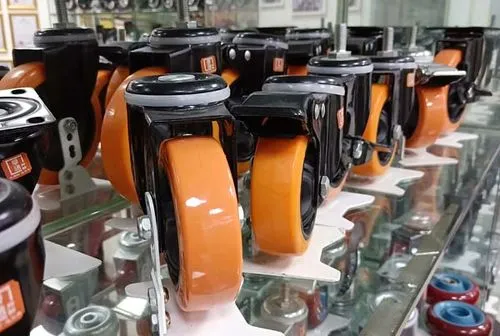
In this article, we delve into a comprehensive comparison of nylon wheels versus polyurethane wheels. We’ll explore what these materials are, their characteristics, and the pros and cons of each type. Understanding these aspects will empower you to make an informed decision, ensuring your equipment rolls smoothly and effectively for its intended use.
2. What are Nylon Casters?
Nylon casters are a popular choice in the caster wheel market, renowned for their strength, durability, and cost-effectiveness. Made from high-grade thermoplastic polymers, nylon wheels offer a unique combination of toughness and resilience, making them suitable for a variety of applications. But what exactly are nylon casters, and what makes them stand out?
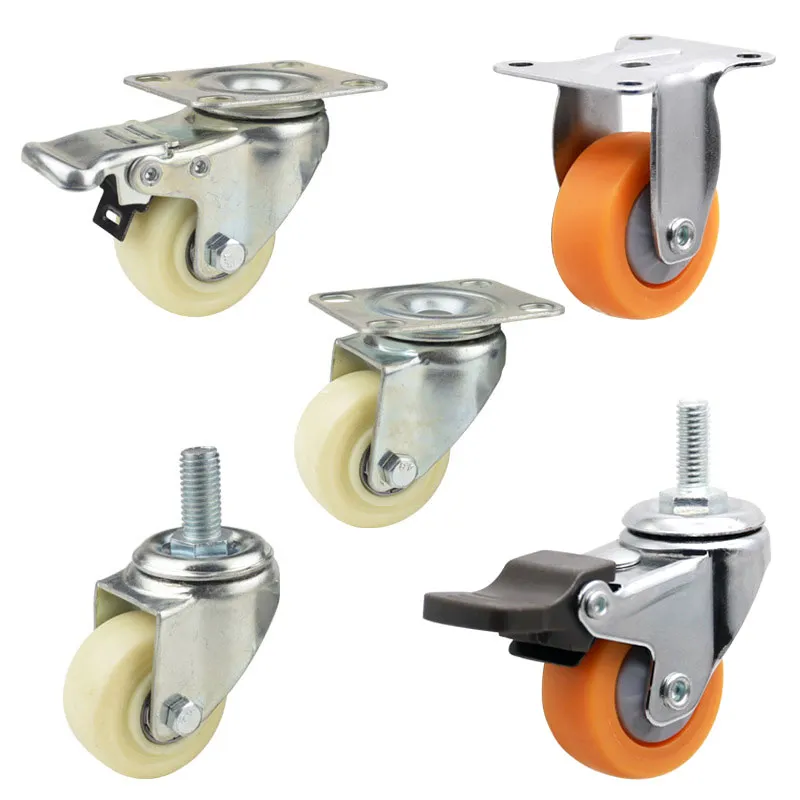
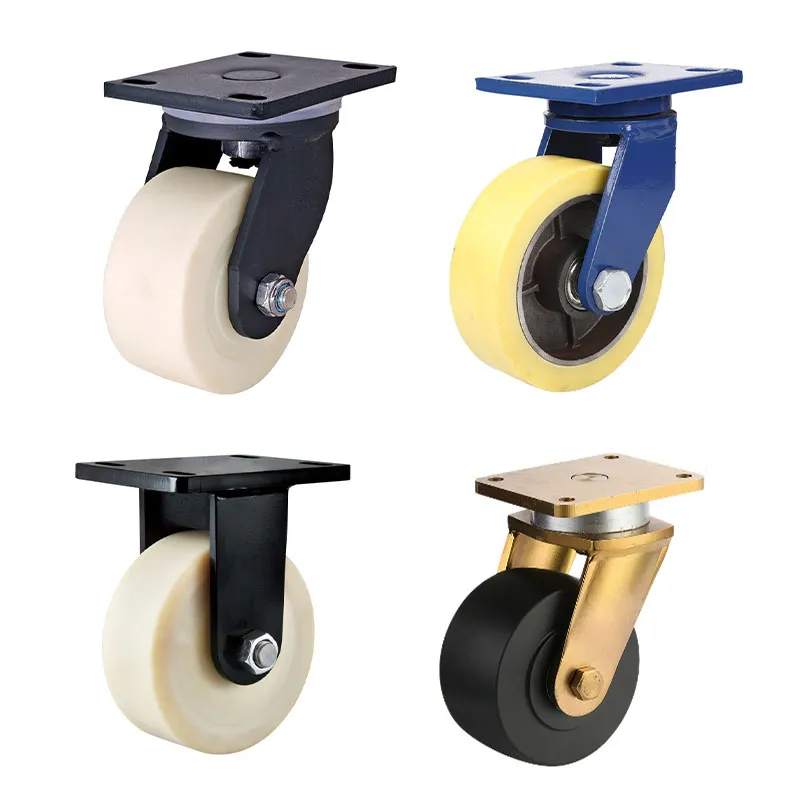
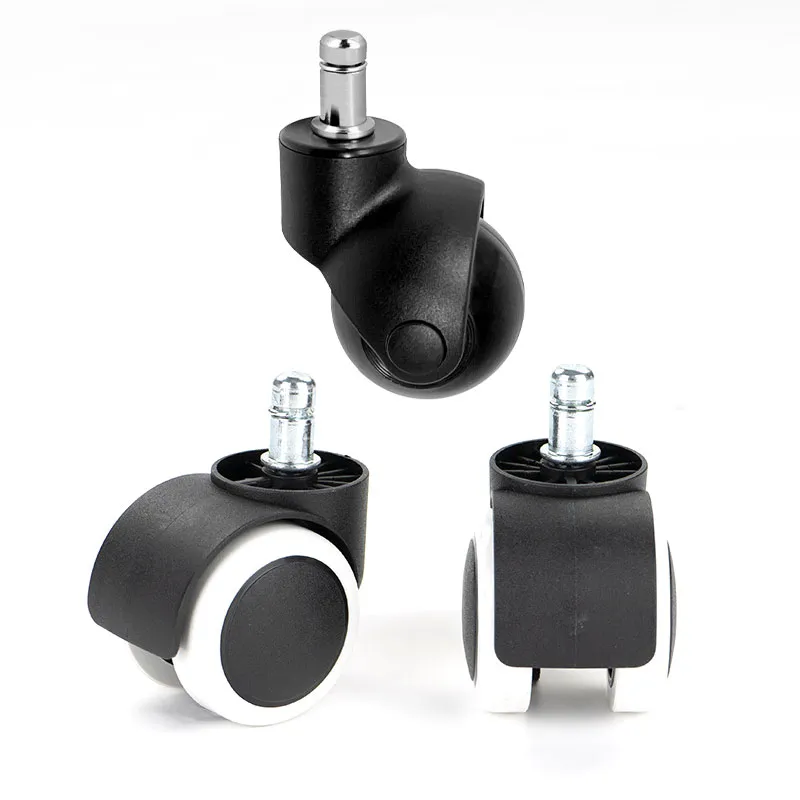
Characteristics of Nylon Materials:
-Durability: Nylon is known for its excellent wear resistance, which translates to a longer lifespan for the casters.
– Strength: It can bear significant loads without deformation, making it ideal for ağır hizmet uygulamaları.
– Resistance to Corrosion and Chemicals: Nylon casters are impervious to many chemicals, oils, and solvents, enhancing their suitability in harsh environments.
– Low Maintenance: These wheels require minimal upkeep, as nylon is resistant to dirt, dust, and other contaminants.
Advantages of Nylon Wheels:
-Cost-Effective: Nylon casters are generally more affordable than their counterparts, offering a budget-friendly option without sacrificing quality.
– Low Rolling Resistance: They provide ease of movement, requiring less effort to start and maintain motion.
– High Load Capacity: Suitable for carrying heavier loads, nylon wheels are a go-to for industrial and commercial applications.
Disadvantages of Nylon Wheels:
– Noise: Nylon wheels can be noisy, especially on hard or uneven surfaces, which might be a concern in noise-sensitive environments.
– Limited Shock Absorption: They offer less cushioning compared to softer materials, which can be a disadvantage when transporting delicate items.
– Hardness: The hardness of nylon can lead to wear on certain types of flooring, making them less suitable for sensitive surfaces.
In summary, nylon casters are a robust, cost-effective solution for many applications, particularly where strength and durability are paramount. However, their noise levels and hardness might make them less ideal for certain environments. This makes it crucial to consider the specific requirements of your application before choosing nylon wheels.
3. What are Polyurethane Caster Wheels?
Polyurethane casters, often referred to as PU casters, are another widely used option in various industries, valued for their versatility and protective qualities. These wheels are made from a type of polymer composed of organic units joined by urethane links, offering a unique blend of elasticity, toughness, and durability. Here’s a closer look at what polyurethane casters are and their defining features.
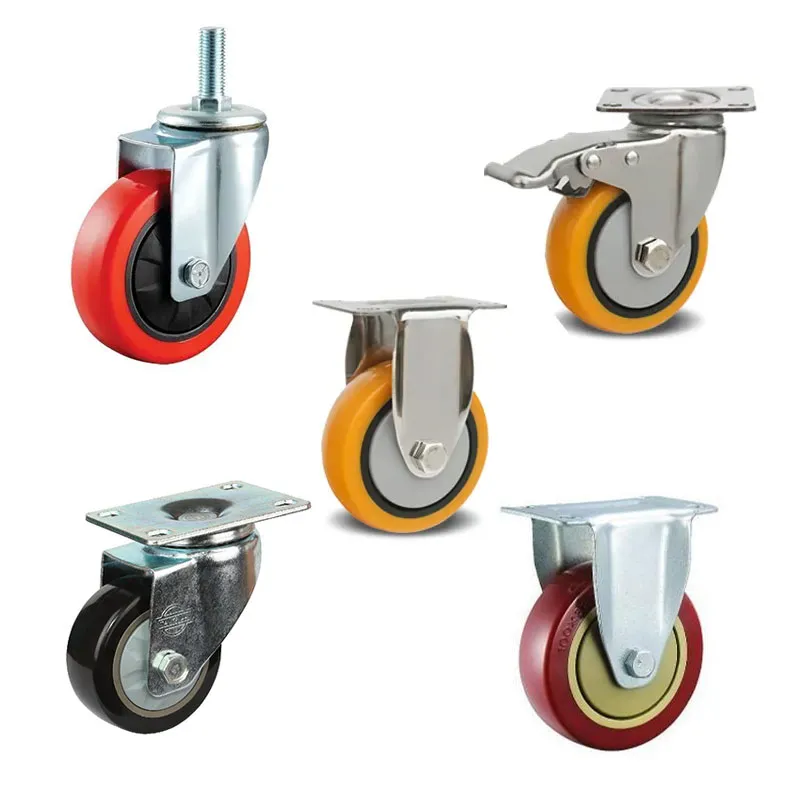
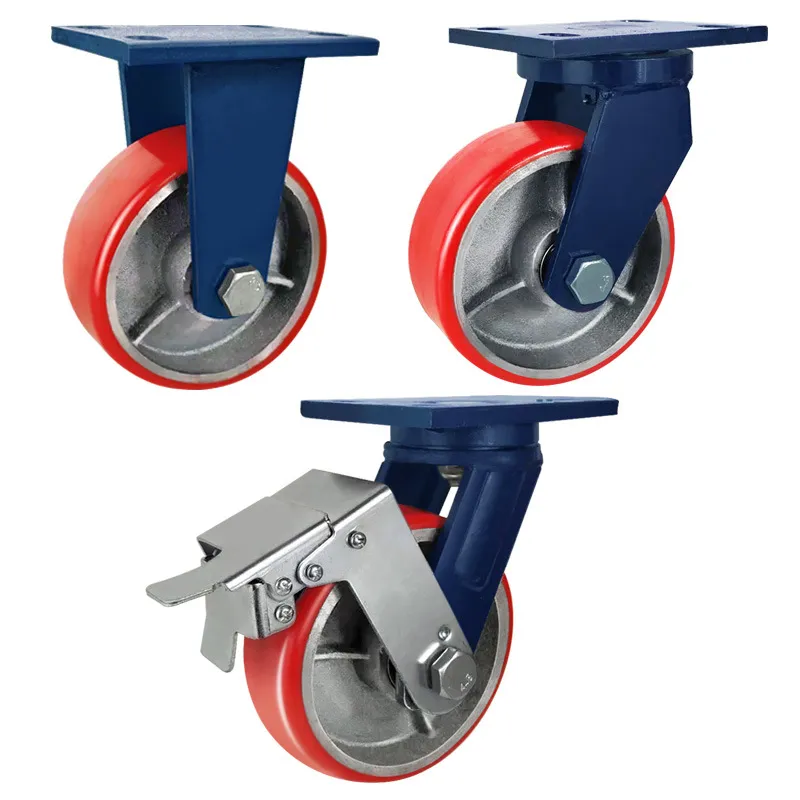
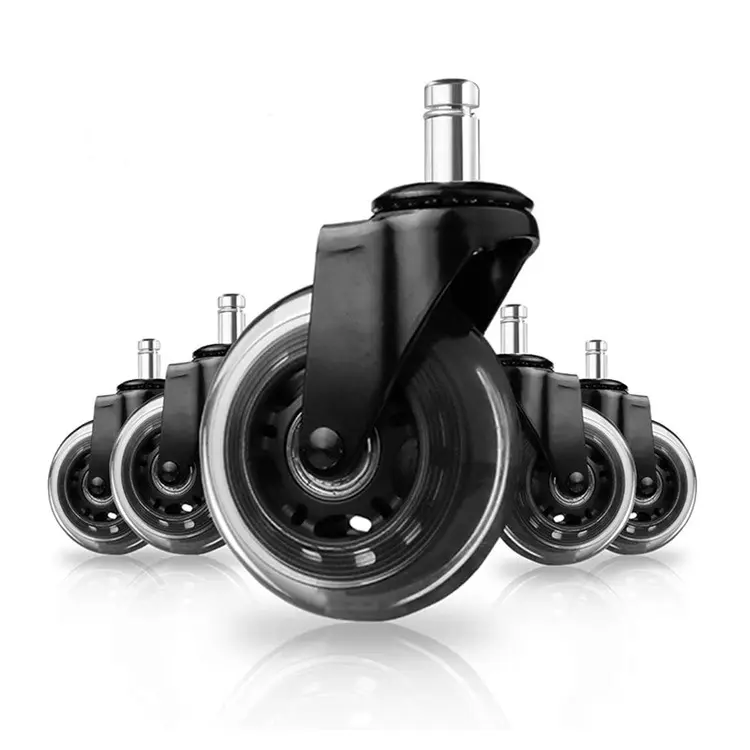
Characteristics of PU Materials:
– Floor Protection: PU wheels are softer and more pliable compared to nylon, making them less likely to damage or mark flooring surfaces.
– Noise Reduction: They operate more quietly, absorbing shocks and vibrations, which is beneficial in noise-sensitive environments like hospitals and libraries.
– High Load Capacity with Cushioning: While strong enough to support heavy loads, PU casters also provide a cushioning effect, offering a balance of strength and gentleness.
– Resistance to Wear and Tear: Polyurethane is resistant to abrasion and can withstand continuous use without significant wear.
Advantages of PU Wheels:
– Non-Marking: They are less likely to leave marks on floors, maintaining the appearance of your flooring.
– Versatility: Suitable for a wide range of applications, from light-duty furniture to heavy-duty industrial equipment.
– Chemical Resistance: PU casters hold up well against a variety of chemicals, oils, and greases.
– Customizable: The flexibility of polyurethane allows for a range of hardness and load capacities, making these wheels customizable to specific needs.
Disadvantages of PU Wheels:
– Cost: Generally, PU wheels are more expensive than nylon, which might be a consideration for budget-conscious buyers.
– Potential for Flat Spots: Under static loads for extended periods, PU wheels can develop flat spots, which might affect their rolling smoothness.
– Sensitivity to Environmental Conditions: Extreme temperatures and certain chemicals can degrade polyurethane more rapidly than other materials.
In essence, polyurethane casters offer an excellent blend of floor protection, noise reduction, and load-bearing capacity. They are particularly well-suited for applications where floor care and noise levels are primary concerns. However, their cost and sensitivity to certain conditions are factors that should be weighed when making a decision.
4. Nylon Vs Polyurethane Wheels – Comparative Analysis
①. Load Capacity:
– Nylon Wheels: Known for their high strength, nylon wheels can support heavier loads. They are less likely to deform under weight, making them ideal for heavy-duty industrial applications.
– Polyurethane Wheels: While also capable of bearing substantial loads, PU wheels offer the added benefit of cushioning, which can be advantageous for transporting delicate items or equipment.
②. Chemical Resistance:
– Nylon Wheels: These wheels exhibit excellent resistance to many chemicals, oils, and solvents, making them suitable for harsh environments or areas where chemical spills might occur.
– Polyurethane Wheels: PU casters also provide good chemical resistance, though they can be more susceptible to certain types of chemicals compared to nylon.

③. Water Resistance:
– Nylon Wheels: Nylon’s inherent water resistance makes it a suitable choice for environments where exposure to moisture is frequent.
– Polyurethane Wheels: PU wheels generally perform well in moist conditions, but prolonged exposure to water can affect their physical properties over time.
④. Impact Resistance:
– Nylon Wheels: Nylon is less effective in absorbing shocks, which could be a downside when handling fragile materials or equipment.
– Polyurethane Wheels: PU casters excel in shock absorption, protecting both the wheel and the equipment from impacts and vibrations.
⑤. Wear Resistance:
– Nylon Wheels: The durability of nylon translates to excellent wear resistance, making these wheels a great choice for long-term use in demanding environments.
– Polyurethane Wheels: PU wheels also have good wear resistance, but they might wear down more quickly under extreme conditions or heavy loads.
⑥. Applicable Floor Types:
– Nylon Wheels: Best suited for industrial floors, concrete, or other hard surfaces where floor damage is not a concern.
– Polyurethane Wheels: Ideal for sensitive flooring like hardwood, tile, or linoleum, as they are less likely to cause scratches or marks.
In conclusion, both nylon and polyurethane caster wheels have their distinct advantages and disadvantages. Nylon wheels are typically more suited for heavy-duty, industrial environments where durability and load-bearing are key. In contrast, polyurethane wheels are preferable in settings where floor protection, noise reduction, and impact resistance are vital. Your choice will depend on the specific needs of your application, balancing factors like load requirements, environmental conditions, and floor type.
5. Expert Advice from Andrew, Caster Expert at Bullcaster
As a seasoned expert in caster wheel technology at Bullcaster, I have seen firsthand the diverse requirements and challenges our clients face when selecting the right casters for their needs. Whether you are outfitting a new set of industrial equipment or replacing wheels on Ofis mobilyaları, the choice between nylon and polyurethane casters is pivotal. Here are my personalized suggestions to help guide your decision:
①. Consider the Environment: Nylon wheels are your best bet in environments where durability and load capacity are key, especially in areas where floor condition is not a primary concern. Think industrial warehouses or outdoor applications.
②. Flooring Matters: If you’re operating on delicate surfaces like hardwood or linoleum, polyurethane casters are the way to go. Their non-marking and floor-protective properties will ensure your floors stay in pristine condition.
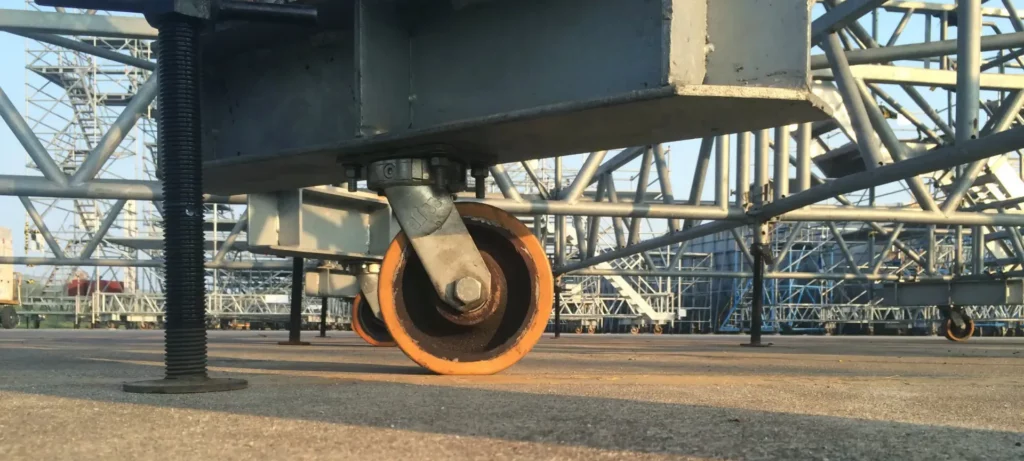
③. Noise Sensitivity: In settings where noise reduction is crucial, such as hastaneler, libraries, or office spaces, the quieter operation of PU wheels offers a significant advantage.
④. Budget Constraints: If budget is a significant factor, nylon wheels offer a cost-effective solution without compromising on durability and load capacity.
⑤. Specialized Needs: Remember, certain applications might have specific requirements. For example, if you’re dealing with equipment that will be stationary for extended periods, be cautious with PU wheels due to the potential for flat spots.
⑥. Long-Term Considerations: Think about the longevity and maintenance of the casters. Nylon wheels generally require less maintenance, whereas PU wheels, though durable, might need more attention over time, especially in harsh environments.
Ultimately, the choice between nylon and polyurethane casters depends on a balance of factors including cost, environment, load requirements, and floor protection. At Bullcaster, we pride ourselves on providing expert advice and high-quality solutions tailored to your unique needs. Don’t hesitate to reach out for personalized assistance in selecting the perfect caster wheels for your application.
6. Conclusion
In summary, the choice between nylon and polyurethane caster wheels hinges on a detailed understanding of your specific needs and the environment in which the wheels will be used. Nylon wheels offer unmatched strength and durability, making them ideal for heavy-duty and industrial applications. On the other hand, polyurethane wheels provide excellent floor protection, noise reduction, and shock absorption, suitable for environments where these factors are crucial.
At Bullcaster, we recognize that every client has unique requirements, and our commitment is to provide you with the best solutions tailored to your specific needs. Our range of high-quality nylon and polyurethane casters is designed to meet diverse applications, ensuring reliability, efficiency, and longevity.
Contact us now for inquiries and orders, and experience the Bullcaster difference in quality and service.


